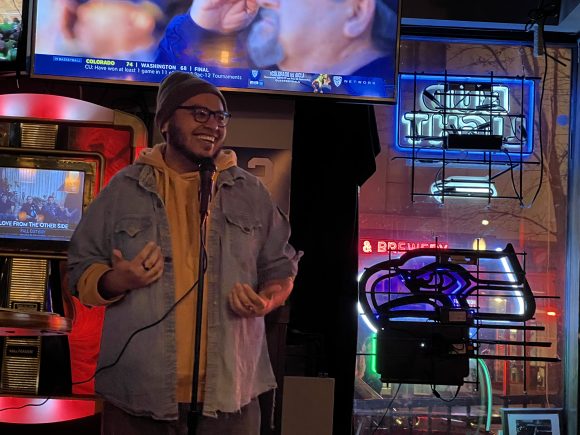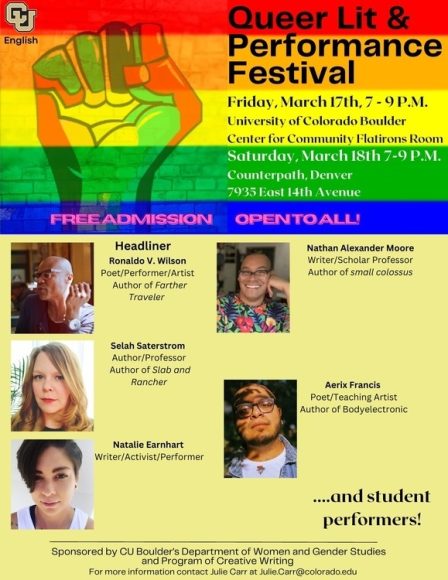
Aerik Francis performs at a poetry event on March 8 in Seattle, Washington. (Courtesy of Aerik Francis and Nikki Ummel)
On March 17 and 18, the University of Colorado Boulder’s Department of Women and Gender Studies and the creative writing program will host the first-ever Queer Literature and Performance Festival, where Denver-based poet Aerik Francis will be a featured author.
In some ways, Francis was the inspiration for the festival.
Women and Gender Studies Department Chair Julie Carr saw Francis perform at Counterpath Denver, where the second night of the festival will be held and of which Carr is a co-founder. Francis’s poetic reflections – delivered through both spoken word and their signature soundscapes – on the body and the politics associated with it roused Carr to take the leap and organize the festival.
“It was seeing [Francis] perform at my space that gave me the idea to create this festival. [They] gave an absolutely amazing performance,” said Carr. “I thought, ‘Wow, I really want [Francis] to come to campus and perform for our students.’ And then I thought, ‘Well, actually, why don’t we just do a whole festival of queer performance and include [them] in that?’”
Their poems and signature soundscapes resonate as avenues of self-expression and understanding, and they come to life when Francis performs onstage.
For Francis, the goal of participating in festivals like this one is to get their poetry out into the world and let it resonate in all its different forms. Francis has published their poetry on several occasions, but most prolifically in their 2022 chapbook “BODYELECTRONIC” and in an EP of poetry songs called “SYZYGY.”
Francis translates their work into these mediums both to expand access to their work and to bring the words on their pages to life in a new, experimental way.
“It allows more room for experimentation and play in ways that I might not be able to do live,” said Francis. “The project is called BODYELECTRONIC, so there are a lot of electronic sounds, [like] a soundscape; there’s glitching and lagging in ways that I can’t do on the page, nor can I do in real life. I like having all these spaces to stretch out what I think poetry can do.”
As the title of their chapbook suggests, Francis’ work often focuses on the body and the politics inherently associated with it.
“So often, we take for granted living in a body that we don’t actually check in with our bodies,” said Francis. “I think so much about our bodies is made political, [or] is made taboo, [or] is made unacceptable in society. I like using my poetry as a space to give us permission to explore those and to talk about these things openly and freely.”
Through exploring Francis’s work, Carr said there are three key themes that she’s discovered running through their poetry.
“One of those is a really strong emphasis on the sonic; on sound and sound play. And then a sort of theoretical or intellectual strain runs through their work. And then a third strain, which is a really personal and vulnerable honesty,” said Carr. “All three are present in their work in different ways at different times. I find that range to be really fascinating and powerful.”
Briannah Hill is a CU Boulder alum, a grade school educator, and a fellow poet and co-executive director of the Denver poetry nonprofit Sacred Voices. Hill met Francis at a slam poetry event and was struck by the fervor of their performance style.
“I love that [Francis] mixes everything they love into their work; the love of their music, the love of their community, the love of their body,” said Hill. “It just comes out like a song, like a rap, like a poem, like a conversation, like a rant, and you just don’t know what you’re in for until [Francis] starts speaking.”

The poster for the Queer Literature and Performance Festival. (Courtesy of the CU Department of Women and Gender Studies)
The Queer Literature Festival falls on the same weekend as the Transforming Gender Conference, an annual conference that aims to raise awareness about transgender issues in the Boulder community and beyond. Hill is participating in the Transforming Gender Conference as a featured educator. They believe that events like these serve to enliven the poetry community while opening up a space for conversation about important trans issues.
“To see that people are coming together just being poets is really important, because that art style, that community is slowly dying. To see it come back to life with every event, with every new stanza, it’s just super cool,” said Hill. “[It’s] the same with [the] Transforming Gender Conference. Trans people are often erased, whether violently or subtly. [It’s important] to have an [international] conference dedicated to trans identities, bringing in guest speakers and keynotes from different places of the world and hearing them speak while also hearing your community members speak.”
Carr said that the festival’s goal is twofold: to expose the campus community to individual queer authors from Colorado and beyond, and to broaden the reach of her department.
“I want to highlight the work of some really wonderful [LGBTQ+] writers and performers who live here in Denver and Boulder, or who are from out of town and whose work I greatly admire and wanted to get our community a chance to witness their brilliant work,” said Carr. “[I also] want the Women and Gender Studies Department to have opportunities to be more visible on campus and beyond.”
Francis hopes their audience can hear their performances and feel more able to express themselves authentically through creative modes like poetry.
“I think we’re always asking others for permission to exist, for permission to be, for permission to wear and express our identity however we like,” said Francis. “What I hope this festival does, what I hope that my work can possibly do, is offer permission.”
The Queer Literature Festival will take place from 7 to 9 p.m. on both Friday and Saturday nights, featuring headlining performer and author Ronaldo V. Wilson and ten student performers. Find more information about the festival here.
Contact CU Independent Arts and Entertainment Editor Lauren Hill at lauren.hill-2@colorado.edu.
